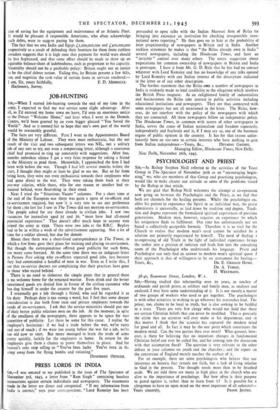JOB-HUNTING
SIR,--When I started job-hunting towards the end of my time in the army, I expected to find my war service some slight advantage. After all, as I'd entered my home town on leave, I'd seen an enormous notice to the Forces " Welcome Home," and later when I went to the Demob. Centre, we'd been greeted by an even bigger placard " You Saved the World." And so it seemed fair to hope that one's own part of the world would be reasonably grateful.
The facts are very different. First I went to the Appointments Board of the Ministry of Labour. They were most enthusiastic, but the net result of the visit and two subsequent letters was NIL, not a solitary job of any sort to try, not even a temporising letter, although a courteous chief had promised to ring up constantly with suggestions. After foui months unbroken silence I got a very faint response by asking a friend in the Ministry to prod them. Meanwhile, I approached the firm I had been with before the war. Though I had left several months before the start, I thought they might at least be glad to see me. But so far from being keen, they were not even enthusiastic towards their employees who had gone direct to the war. They were taking them back at their pre-war salaries, while those, who for one reason or another had re- mained behind, were flourishing in their stead.
Next I tried the " Situations Vacant " columns. For a short time at the end of the European war there was quite a spate of ex-officers and ex-servicemen required, but now it is very rare to see any preference for them ; the last list I saw in The Times did not mention ex-servicemen. The people asked for are those already in civilian jobs. I saw two vacancies for journalists aged 25 and 26, " must have had all-round provincial experience." That doesn't offer much hope to anyone wno joined the army in 1939. There were two jobs at the B.B.C. Replies had to be in within a week of the advertisement appearing. Not a lot of time for a soldier abroad, but due for demob.
About then there was a short-lived correspondence in The Times, in which a few firms gave their plans for training and placing ex-servicemen. But though the correspondence offered good publicity for such firms, not many came forward. At the same time there was an indignant letter in Picture Post asking why ex-officers expected good jobs, just because they had commanded a handful of men in war. Even as I write this, I see that ex-service doctors are complaining that their practices have gone to those who stayed behind. • There is no need to elaborate the simple point that in general there is no welcome home for the returned warrior. Even drink and the better =rationed goods are denied him in favour of the civilian customer who has dug himself in under the counter for the past five years.
I eventually got a job through a friend, who said he regarded it as his duty. Perhaps duty is too strong a word, but I feel that some deeper consideration is due both from state and private employers towards the needs of ex-servicemen. I ask that the service ministries should put one of their better public relations men on the job. At the moment, in spite of the smallness of the newspapers, there appears to be space for vast quantities-of publicity. Let there be some for this cause. I realise the employer's hesitation: if we had a trade before the war, we're rusty and out of touch ; if we were too young before the war for a job, we're too old now to start. But many managed to learn the trade of arms pretty quickly, luckily for the employers at home. In.return let the employers give them a chance to prove themselves in peace. And for heaven's sake stop telling us " You've been lucky You've been in the army away from the flying bombs and rationing."
DEMOBBED OFFICER.






























 Previous page
Previous page